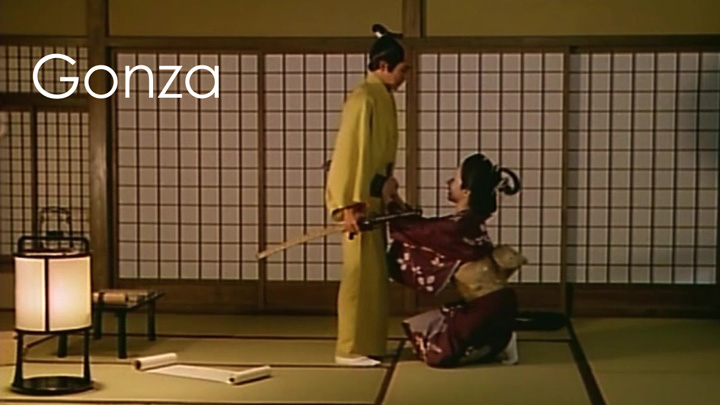
Scenes
Gonza, the spearman
鑓の権三
Gonza, the spearman

Gonza, the spearman
Title: Gonza, the spearma
Original title: 鑓の権三 Yari no Gonza
Published: 1986
Length: 125 minutes
Staff
Director: Masahiro Shinoda
Script: Taeko Tomioka, based on the drama by Monzaemon Chikamatsu (1653-1725)
Music: Tōru Takemitsu
Cast
Hiromi Gō: Gonza Sasano
Shohei Hino: Bannojo Kawazura
Takashi Tsumura: Ichinoshin Asaka
Shima Iwashita: Osai, Ichinoshin's wife
Choichiro Kawarazaki: Jinbei, Osai's brother
Misako Tanaka: Oyuki, Bannojo's sister
Haruko Kato: Oyuki's nurse
Hideji Otaki: Iwaki, Osai's father
Kuniko Miyake: Iwaki's wife
Kaori Misushima: Okiku, Osai's daughter
Eiji Shima: Torajiro, Osai's son
Shoichi Ozawa: Ferryman
Feudal Japan in the 18th century. Life under the Tokugawa Shogunate is peaceful and a little boring. All daimyo have to spend every second year in the capital Edo as part of the "sankin kōtai". So the Shogunate tries to avoid too much autonomy for the provincial princes. The samurai Ichinoshin has been in Edo for three months in the wake of his master. In the clan, he is responsible for the tea ceremony. At this point in time, the longed-for male descendant is born to his master.
In honor of the young heir, a tea ceremony is to be held at home. One of Ichinoshin's disciples should do it. The two chosen ones, the samurais Bannojo and Gonza, vie for the right of execution. The beautiful 25-year-old Gonza wants to climb the hierarchy of his clan through this task. To do this, he tries to elicit the family knowledge for the ceremony from Osai, the wife of his tea master Ichinoshin. Osai is a secret ardent admirer of Gonza. She grants him insight at night. In return, to bind him to the family, she demands that the attractive samurai become engaged to the 15-year-old daughter Okiku. But Gonza is already in a relationship with Bannojo's sister Oyuki. He hides this fact and agrees.
At night, both of them are watched by the jealous Bannojo studying the records. He had written Osai hot love letters beforehand, which she ignored. Bannojo interprets the argument between Osai and Gonzai behind the walls of the tea pavilion as adultery. He trumpets this immediately in the town. The loyal Gonza feels shame. Osai persuades him, probably in the hope of an erotic adventure, to plead guilty to adultery. This is to avert shame on the absent head of the family Ichinoshin (the logic of this consideration is difficult to understand for the western observer). Osai and Gonza are now considered adulterers. At dawn, the two flee to Kyoto. First, Osai's brother Jinbei kills the fugitive Bannojo. The horned husband Ichinoshin returns quickly from Edo and, out of a sense of duty, sets out to persecute adulterers. Ichinoshin wants to kill his faithless wife and mother of his children, despite the misgivings of the four descendants.
During the escape, Osai reveals her passionate feelings for her escape partner, who finally gives in to her. After all, they only have death left anyway. The fugitive lovers are caught by Ichinoshin, who first wounds Gonza and then stabs him with a lance. His unfaithful wife is killed by Ichinoshin's sword. At the end of the film, Ichinoshin's eldest son, Torajiro, performs the tea ceremony.
The film is the work of director Masahiro Shinoda. He was i.a. known from the first film adaptation of Chinmoku (The Silence, 1971). At the 36th International Film Festival in Berlin the film won the Silver Bear in the "Special Artistic Achievement" category for its harmonious composition.
The plot is based on the play "Yari no Gonza" for the puppet theater by the famous Japanese poet Monzaemon Chikamatsu (1653-1725). The plot of the film takes place a decade after the death of the original author (according to the fade in at the beginning of the film in 1735).
The film is only available in low resolution on DVD. However, it shows very nice pictures and calm camera pans, which was perhaps unusual in the genre of Jidaigeki films of the 80s, but was often successful in the early 2000s.
The story falls into the category of "Bourgeois tragedy", although of course the protagonists here are samurai and not ordinary citizens.
It is interesting to see how the characters get caught up in the contradictions of their code of ethics and honor. When the only 12-year-old son Torajiro appears as the willing avenger of the samurai honor, one does not know whether this is meant seriously or ironically.
Another aspect is the study of the tea ceremony for the sake of social recognition and advancement in the hierarchy of the clan. (The film "ICHINICHI KORE KOJITSU" from 2018 offers a much more authentic approach to tea ceremony).
The film is worth to be watched because it is based on a classic work and depicts the peculiarities of this time and the samurai. This should prevent Aikidoka from enthusiastically looking for any samurai ideals in Aikido.